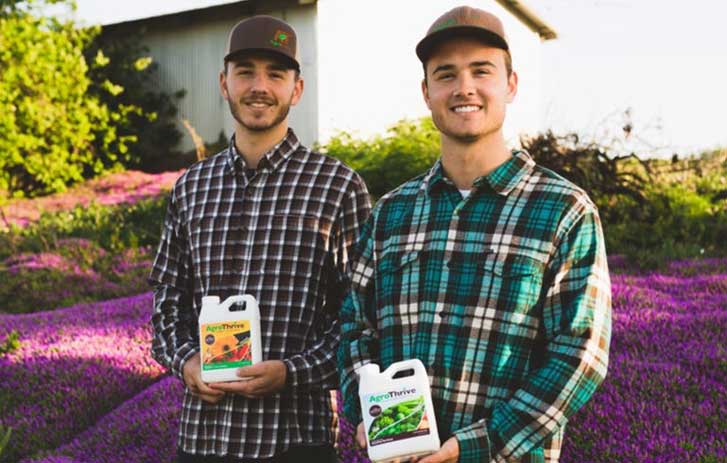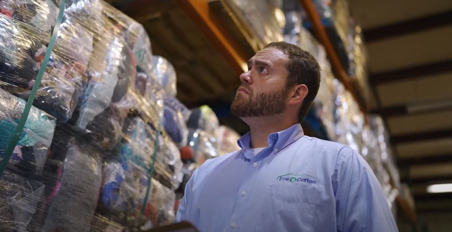Erie Cotton: A rags-to-riches story
Founded by his grandfather in 1946, Brian Rubin heads up Erie Cotton, a company that recycles unwanted clothing and other fabrics into wiping cloths. Erie Cotton then sells these wiping cloths to other businesses for cleaning.
"Eighty-five percent of all clothing ends up in the landfill, and only 15% is donated," Brian explains. "Of the donated clothing, about 30% can be recycled into wiping cloths." Erie Cotton sources most of their textiles from large thrift chains. Cotton materials, like t-shirts, are perfect for recycling.
Fashion trends affect the kinds of material available to Erie Cotton. The company navigated polyester leisure suits in the 1970s by developing a wiping cloth made from cellulose. Their latest challenge is the rise of fast fashion, which churns out cheap, low-quality clothes made from synthetic materials. Brian and his team work with the industry to develop innovative ways to use these fabrics.
"Our goal is to be completely green," Brian says. "We recycle all our cardboard, metal, and any other materials we can." But the company's commitment to doing good doesn't end with sustainability. They also employ many refugees, who make up around 20% of Erie, Pennsylvania's population. This benefits the community and helps the workers develop English language skills, setting them up for future career success.
Of the company's business, 95% is wholesale. FedEx played an important part in helping Erie Cotton expand sales globally and refine product packaging for more efficient shipping. "FedEx was right there on the ground level with us, helping to design a lot of our processes," Brian notes. He counts on the partnership and knows he can rely on his FedEx representative for small business support and quick shipping solutions.
When asked for advice to help aspiring entrepreneurs interested in sustainable businesses, Brian says it's all about understanding the world around you. "Try to create value by coming up with new products using items that didn't have value before," he advises. As a recipient of the 2024 FedEx® Small Business Grants Program, Erie Cotton plans to use these funds to invest in new equipment to package and sell wiping cloths in different quantities.
Erie Cotton is a fantastic example of the power of thinking outside the box. Where others might see rags and discarded, old clothing, they saw an opportunity. Their forward-thinking approach created jobs and enriched the lives of many in their community, proving that sustainability and success can go hand in hand.
Founded by his grandfather in 1946, Brian Rubin heads up Erie Cotton, a company that recycles unwanted clothing and other fabrics into wiping cloths. Erie Cotton then sells these wiping cloths to other businesses for cleaning.
"Eighty-five percent of all clothing ends up in the landfill, and only 15% is donated," Brian
explains. "Of the donated clothing, about 30% can be recycled into wiping cloths." Erie Cotton sources most of their textiles from large thrift chains. Cotton materials, like t-shirts, are perfect for recycling.
Fashion trends affect the kinds of material available to Erie Cotton. The company navigated polyester leisure suits in the 1970s by developing a wiping cloth made from cellulose. Their latest challenge is the rise of fast fashion, which churns out cheap, low-quality clothes made from synthetic materials. Brian and his team work with the industry to develop innovative ways to use these fabrics.
"Our goal is to be completely green," Brian says. "We recycle all our cardboard, metal, and any other materials we can." But the company's commitment to doing good doesn't end with sustainability. They also employ many refugees, who make up around 20% of Erie, Pennsylvania's population. This benefits the community and helps the workers develop English language skills, setting them up for future career success.
Of the company's business, 95% is wholesale. FedEx played an important part in helping Erie Cotton expand sales globally and refine product packaging for more efficient shipping. "FedEx was right there on the ground level with us, helping to design a lot of our processes," Brian notes. He counts on the partnership and knows he can rely on his FedEx representative for small business support and quick shipping solutions.
When asked for advice to help aspiring entrepreneurs interested in sustainable businesses, Brian says it's all about understanding the world around you. "Try to create value by coming up with new products using items that didn't have value before," he advises. As a recipient of the 2024 FedEx® Small Business Grants Program, Erie Cotton plans to use these funds to invest in new equipment to package and sell wiping cloths in different quantities.
Erie Cotton is a fantastic example of the power of thinking outside the box. Where others might see rags and discarded, old clothing, they saw an opportunity. Their forward-thinking approach created jobs and enriched the lives of many in their community, proving that sustainability and success can go hand in hand.
Founded by his grandfather in 1946, Brian Rubin heads up Erie Cotton, a company that recycles unwanted clothing and other fabrics into wiping cloths. Erie Cotton then sells these wiping cloths to other businesses for cleaning.
"Eighty-five percent of all clothing ends up in the landfill, and only 15% is donated," Brian explains. "Of the donated clothing, about 30% can be recycled into wiping cloths." Erie Cotton sources most of their textiles from large thrift chains. Cotton materials, like t-shirts, are perfect for recycling.
Fashion trends affect the kinds of material available to Erie Cotton. The company navigated polyester leisure suits in the 1970s by developing a wiping cloth made from cellulose. Their latest challenge is the rise of fast fashion, which churns out cheap, low-quality clothes made from synthetic materials. Brian and his team work with the industry to develop innovative ways to use these fabrics.
"Our goal is to be completely green," Brian says. "We recycle all our cardboard, metal, and any other materials we can." But the company's commitment to doing good doesn't end with sustainability. They also employ many refugees, who make up around 20% of Erie, Pennsylvania's population. This benefits the community and helps the workers develop English language skills, setting them up for future career success.
Of the company's business, 95% is wholesale. FedEx played an important part in helping Erie Cotton expand sales globally and refine product packaging for more efficient shipping. "FedEx was right there on the ground level with us, helping to design a lot of our processes," Brian notes. He counts on the partnership and knows he can rely on his FedEx representative for small business support and quick shipping solutions.
When asked for advice to help aspiring entrepreneurs interested in sustainable businesses, Brian says it's all about understanding the world around you. "Try to create value by coming up with new products using items that didn't have value before," he advises. As a recipient of the 2024 FedEx® Small Business Grants Program, Erie Cotton plans to use these funds to invest in new equipment to package and sell wiping cloths in different quantities.
Erie Cotton is a fantastic example of the power of thinking outside the box. Where others might see rags and discarded, old clothing, they saw an opportunity. Their forward-thinking approach created jobs and enriched the lives of many in their community, proving that sustainability and success can go hand in hand.
Keep dreaming and doing. There’s more ahead.
Keep dreaming and doing. There’s more ahead.
The FedEx Small Business Grants Program helped entrepreneurs grow for 12 years. It’s retiring,
but our support for small businesses isn’t. Find other ways to compete and win.
The FedEx Small Business Grants Program helped entrepreneurs grow for 12 years. It’s retiring, but our support for small businesses isn’t. Find other ways to compete and win.
Training and grant opportunities
Shipping savings and rewards
Peer and expert insights
Inspiration from past recipients
Training and grant opportunities
Shipping savings and rewards
Peer and expert insights
Inspiration from past recipients
Related reading

AgroThrive: Together we thrive
Learn about 2023 Small Business Grant (a legacy program) winner, AgroThrive.
Read article
The Cupcake Collection: Delivered with love
Learn about 2023 Small Business Grant (a legacy program) winner, The Cupcake Collection.
Read article